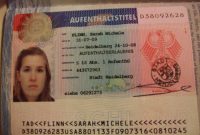Studying in Germany is an amazing experience that gives students the unique opportunity to build a bridge between two cultures. However, language can be a big barrier when settling in a foreign country. This guide will take you through the essential language preparation steps to ensure you’re able to communicate effectively with locals and understand academic concepts while studying in Germany.
Having a basic understanding of the German language prior to arrival to Germany will not only make it easier for you to adjust to the new environment, but it will also be essential to ensure you enjoy everything the country has to offer.
Steps Needed Before You Depart
When preparing to travel and study in Germany, there are certain steps that you must take before you depart, to ensure you have a smooth and stress-free start to your journey. These steps include checking your passport validity, obtaining a student visa, promoting health and safety, and getting your finances in order.
Check Your Passport Validity
The first step you should take before making your way to Germany is to make sure your passport is up to date. German laws require all nations entering their borders to have a passport that is valid for a minimum of three months past their intended departure date. It is important to ensure that your passport has a valid expiration date and is not running out of blank pages.
Obtaining a Student Visa
If you plan to travel and study in Germany for longer than three months, you’ll need to obtain a student visa. The visa process can vary based on which country you are a citizen of and your purpose of coming to Germany. You can expect to need to provide passport information, a cover letter, furnished housing proof, proof of course enrollment, and a CV.
Promoting Your Health and Safety
Before departing for your study abroad adventure, there are some practical steps that you should take to ensure your safety in Germany. Inquire with your health care provider if you need any vaccinations and if your existing medical insurance plan is valid in Germany. Furthermore, be aware of the potential risks or threats that you may encounter on your journey.
Getting Your Finances in Order
If you plan to study in Germany, it is important to be aware of expenses you may incur in the process. To be financially prepared, it is recommended to open a student bank account, obtain a debit or credit card, or obtain a European Health Insurance Card (EHIC). Additionally, you will need to exchange your home currency to the local currency of Germany, the Euro.
By taking the necessary steps, you can ensure that you have a smooth journey and can start your study abroad adventure without any delays.
Learning the German Language

Learning a new language can be a challenge. But it can be a rewarding experience with valuable life-long benefits. German is a fascinating and one of the toughest European languages to learn. But it doesn’t have to be intimidating. With the right strategies and tools, you can start to learn German right away.
If you are planning to move to Germany for study or work, then you will need to consider learning the German language. For those who are serious about learning the language, here are some essential steps to help you get started.
Create a Structured Language Learning Plan
Creating a learning plan is a great way to get you motivated and on track for mastering the language. It’s important to set achievable goals and determine the methods you will use to reach them. Start by finding out which topics and core elements you need to focus on. For example, you could start by learning the most common German words, practice the verb conjugations, and work on mastering basic grammar.
You can then determine how much time you will need to study and which resources you will use. For instance, you could dedicate one hour a day for language practice or use an online language course. Also, consider setting up a rewards system. For instance, reward yourself after each milestone you reach or each accomplishment.
Find Resources To Help You Learn
There are plenty of resources available to help you learn the German language. These include language courses, textbooks, vocabulary guides, audio books, and language apps. You might also consider attending a language class or hiring a private tutor.
It’s a good idea to utilize various different resources when learning the language. That way, you can learn in different ways, switching between approaches and reinforcing your understanding of the language.
Start Making Connections and Practicing Your German
Put your newly acquired language skills into practice. This includes connecting with German speakers and speaking the language as much as possible. Start by talking to friends, family, or colleagues who may be native or fluent German speakers. If you can’t find anyone immediately, you can also connect with a native German speaker online or attend a local meetup.
You can also engage with German culture. Watching movies, listening to music, and reading newspapers and books can be a great way to gain insight into the language and culture. You should also consider joining online forums and groups to talk to other German language learners. This is important, as it will not only help you to practice your German, but also to build an understanding of the culture.
Important Resources To Further Your German Language Skills
For anyone who is planning to study in Germany, mastering the German language is essential if you want to gain confidence and be able to effectively communicate with other people fluently. It is very important to have the necessary resources and learn the language properly for a smoother transition into Germany’s culture and lifestyle. This article will provide essential information to further your German language skills and help you settle in the country.
Online Language Learning Platforms
The internet has a vast array of language learning tools for any aspiring language learner. A popular go-to resource is Duolingo, which is used by millions of users: It can help you learn more than 23 languages, including German. There are also several German apps available on the App Store and the Play Store, such as Busuu, Lingvist, and Babbel, whose courses are tailored to help you become fluent quickly.
Foreign Language Learning Centers
There are a multitude of language learning centers in Germany, which offer courses in German, both online and in-person. These centers specialize in providing language courses in German for learners of all levels. Many of these centers also offer immersion programs, enabling learners to learn from native speakers and get an in-depth understanding of the language at a more accelerated pace.
German Language Exchange Programs
Language exchange programs are a great way to meet new people and practice speaking German. These programs are a platform for you to find native German speakers who are looking to also learn a new language, and are willing to teach you German in exchange for teaching a language they are looking to learn. This is a great way to gain confidence in your newly acquired language skills and speak with more fluency.
Podcasts and Online Videos
Podcasts and online videos are a great way to gain insights into the culture and lifestyle of Germany while learning the language. Listen to your favorite podcasts and watch engaging videos in German to further your skills and pick up some new vocabulary at the same time. Podcasts and videos are a great way to immerse yourself in the language and become more comfortable speaking with native German speakers.
Useful Resources
- Goethe-Institut: https://www.goethe.de/en/spr/kup/sta.html
- German Courses: https://www.german-courses.de/
- Language Exchange: https://www.buncee.com/hit-language-exchange-programs-germany/
To sum it up, studying in Germany can be very rewarding if you master the language. With the help of these essential resources, you can easily further your German language skills and smoothly transition into the German way of life.
Conclusion
Ultimately, it is essential to have a comprehensive understanding of the language when seeking higher education in the Germany. While English can be a great bridge language to navigate through everyday life, proficiency in German is needed to ace academic studies and to take part in any future interview process. With the right resources and tools, a mastery of German is an achievable goal.
We have provided some tips to prepare for language courses in German, as well as some other common resources to refer to. With these tools, you can gain the confidence and skills to ace any language course and go on to use German in your work, personal life and other areas. Now you are ready to get started on your journey to success in the German language!




